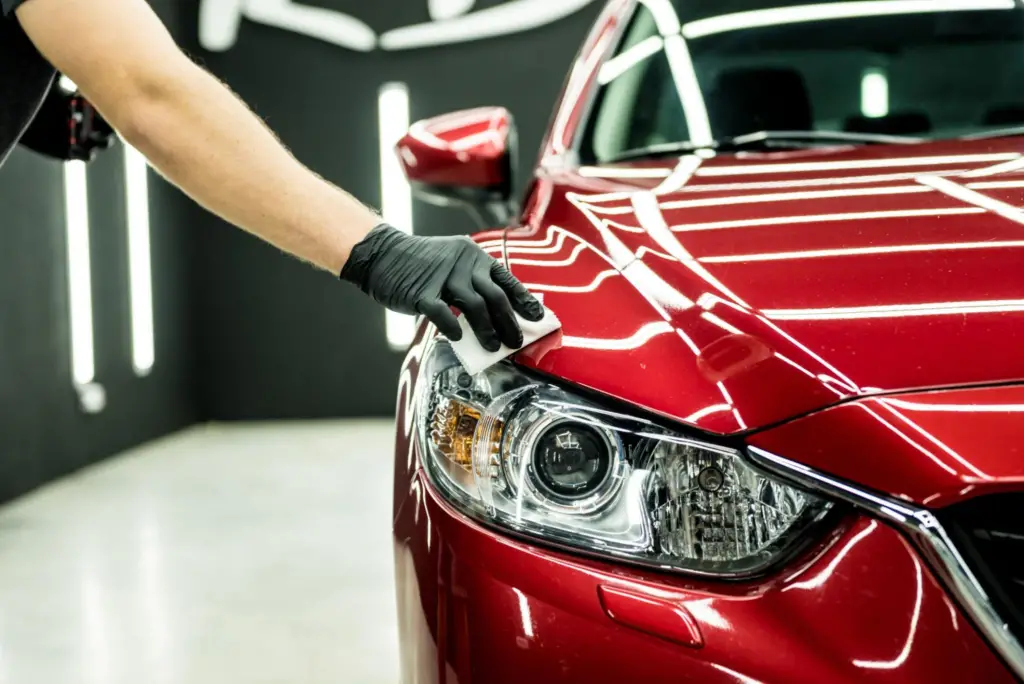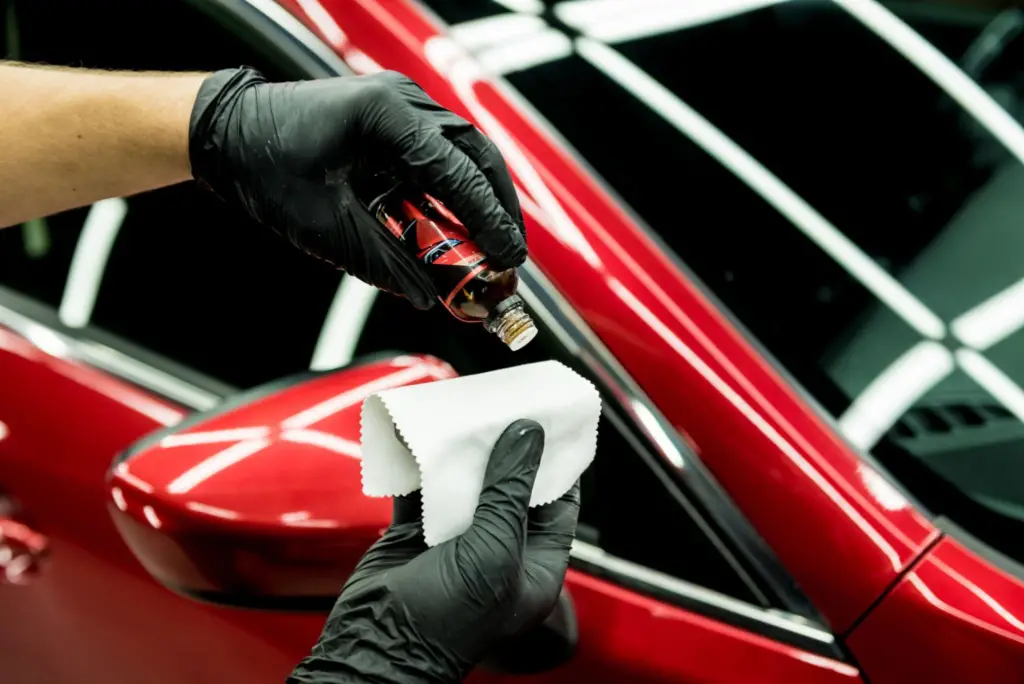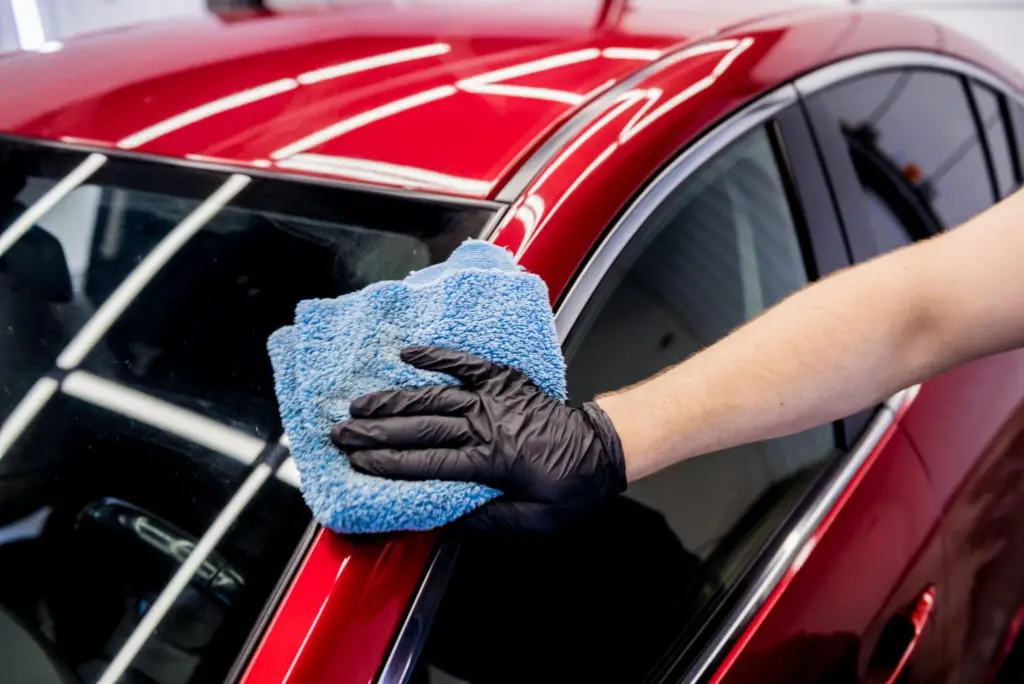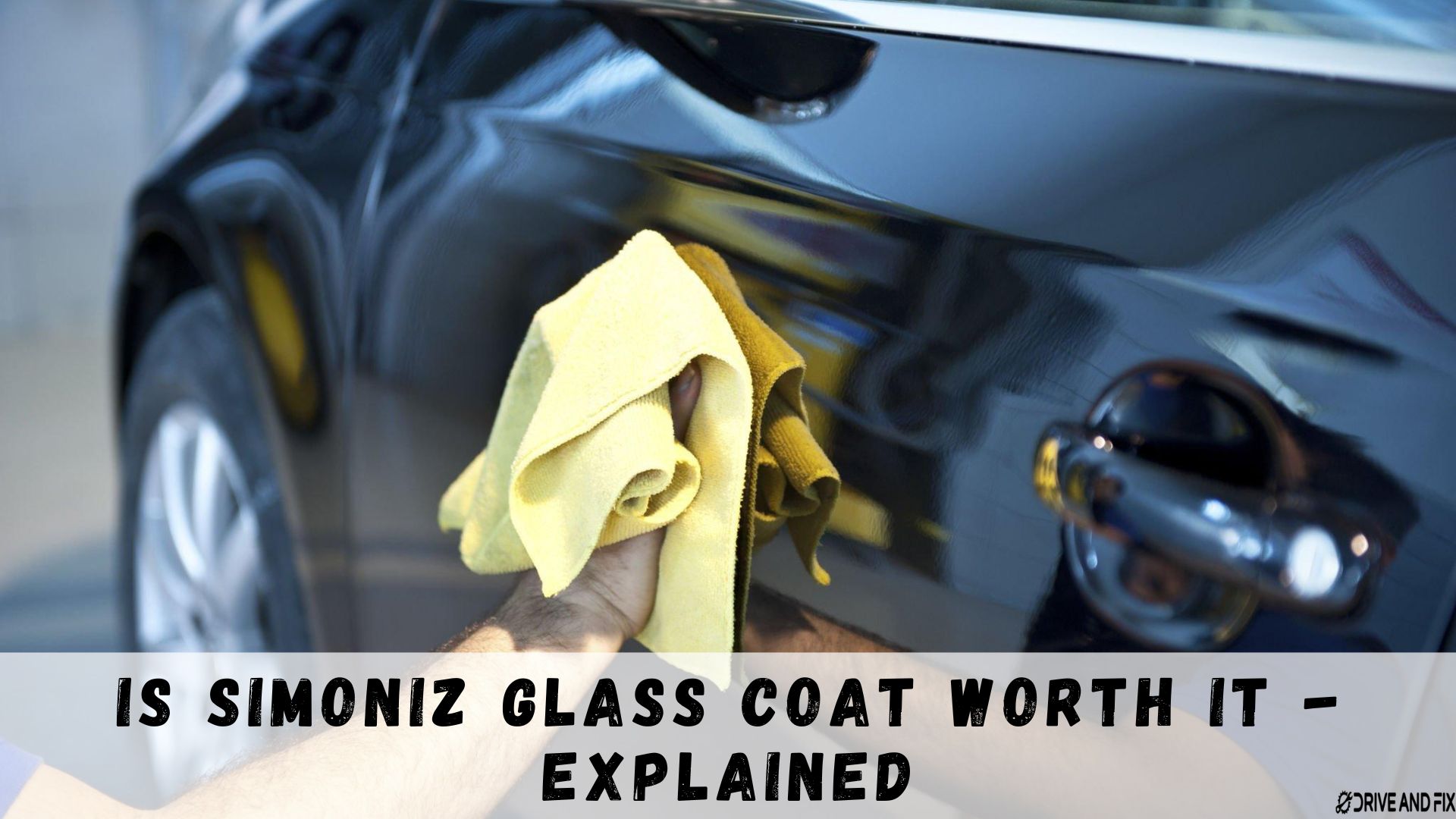Looking to keep your car’s exterior in pristine condition? You may have heard about Simoniz GlassCoat, a paint sealant designed to protect your vehicle’s exterior from environmental damage. But with so many car paint protection options on the market, you might wonder is Simoniz Glass Coat worth it? We’ll provide the information you need to decide whether this paint sealant suits you. So buckle up and get ready to learn everything you need to know about Simoniz GlassCoat!
The Protection Simoniz Glass Coat Offers
Simoniz GlassCoat creates a protective layer on top of the car’s clear coat, preventing environmental damage and keeping it looking its best for longer, as discussed below
- It protects your car’s paint from fading and oxidation caused by exposure to the sun’s UV rays.
- Helps prevent damage to your car’s paint caused by acid rain, which can cause etching and other types of damage.
- It makes it easier to remove bird droppings from your car’s paint and prevent the droppings from etching or damaging the paint.
- Provides a layer of protection against scratches caused by dirt, debris, and other objects.
- It creates a smooth, hydrophobic surface that repels dirt and grime, making it easier to clean your car and keeping it looking its best.
Is Simoniz Glass Coat Worth It- The Cost

The cost of Simoniz GlassCoat can vary depending on several factors, such as the size of your vehicle, the location of the service, and the dealership or detailer providing the service. It is a premium paint protection product that can cost several hundred dollars to apply. However, the cost may be worth it for some car owners looking to protect their vehicle’s exterior paint for years.
Note that the cost may also include additional services, such as paint correction or detailing, which can increase the overall cost of the service. Some dealerships or detailers may offer packages or discounts that can lower the cost of the service. Getting a quote from a reputable dealership or detailer is recommended to determine the exact cost of applying Simoniz GlassCoat to your car.
Simoniz Glass Coat Safety
It is generally safe when applied correctly by a trained professional. The product’s formulation is non-toxic and environmentally friendly. It contains no harmful chemicals or volatile organic compounds (VOCs) that can harm human health or the environment. However, the application process involves polishing equipment and other tools that can cause harm if misused.
When applying Simoniz GlassCoat, follow the manufacturer’s instructions carefully and use the proper safety equipment, such as gloves and eye protection, to avoid any potential skin or eye irritation. Carry out the application process in a well-ventilated area to prevent fumes’ buildup and ensure proper air circulation.
How To Apply Simoniz Glasscoat

A trained professional should perform the application process for Simoniz GlassCoat at a dealership or detailer. However, here is a general overview of the application process:
- Wash and prepare the car: The car should be thoroughly washed and dried to remove any dirt or debris from the surface. Any existing wax or sealants should also be removed.
- Apply the bonding agent: A bonding agent is applied to the car’s surface to help the GlassCoat adhere properly.
- Apply the GlassCoat: Apply the GlassCoat to the car’s surface in a thin, even layer. The application process may involve using a buffer or polisher to ensure an even coating.
- Allow to cure: The GlassCoat is left to cure for a while, typically 24-48 hours, to ensure it bonds properly with the car’s surface.
- Buff and polish: After the GlassCoat has cured, the car is buffed and polished to remove any excess product and give the vehicle a glossy finish.
The Time it Takes to Apply Simoniz Glasscoat
The process can take several hours to complete, depending on the size of the vehicle and the specific application process used by the detailer or dealership.
The curing process typically takes 24-48 hours, during which the car should not be washed or exposed to rain or moisture. Once the GlassCoat has cured, the car can be driven normally, and the protective coating should last for several years with proper care.
Check with your detailer or dealership performing the service to get a more specific estimate of the time required to apply Simoniz GlassCoat to your car.
Simoniz Glass Coating Durability
Simoniz GlassCoat is designed to provide long-term protection for your car’s exterior paint. The exact duration of the protective coating will depend on several factors, such as the driving conditions, the level of exposure to the elements, and the level of care given to the car.
However, It is guaranteed to last several years with proper care. The manufacturer may offer a warranty for a certain number of years or miles, which can vary depending on the dealership or detailer providing the service.
While Simoniz GlassCoat can provide durable protection for your car’s paint, it’s imperative to take proper care of your vehicle to ensure the protective coating lasts as long as possible. This includes regular washing and detailing, avoiding exposure to harsh chemicals or abrasive materials, and practicing safe driving habits to prevent damage to the exterior paint.
Waxing Over Simoniz GlassCoat
It is not recommended to apply wax over Simoniz GlassCoat. The GlassCoat provides a protective layer that lasts for several years and superior protection to traditional wax or sealants. Using wax over the GlassCoat may diminish its protective qualities and reduce its durability over time.
However, if you choose to apply wax over the GlassCoat, it’s important to use a high-quality, non-abrasive wax designed for use on clear coats. Be sure to read the manufacturer’s instructions carefully and avoid using products that contain abrasive materials or harsh chemicals that could damage the GlassCoat.
Regular washing and detailing of your car can help maintain the appearance and durability of the GlassCoat, without the need for additional waxing. If you’re unsure how to care for your car’s exterior paint properly, it’s always best to consult a professional detailer or dealership for advice.
Washing Car After Applying Simoniz Glass Coat
After applying Simoniz GlassCoat, allow the protective coating to cure for at least 24-48 hours before washing your car. This will give the GlassCoat sufficient time to bond with the surface of the car and ensure that it provides optimal protection.
Once the curing process is complete, you can safely wash your car as you normally would, using mild soap and water or a dedicated car washing solution. Do not use harsh or abrasive materials that could damage the GlassCoat or remove the protective coating from the car’s surface.
Does Simoniz Glass Coating Hide Scratches
Simoniz GlassCoat is not designed to hide scratches or other imperfections in your car’s exterior paint. While the GlassCoat does provide a protective layer that can help prevent scratches and different types of damage, it will not eliminate existing scratches or cover up other imperfections.
However, the GlassCoat can help minimize the appearance of minor scratches and swirl marks by providing a high-gloss, reflective finish that can help deflect the light away from the car’s surface. It can also help prevent further damage to the car’s exterior, which can help minimize the appearance of existing scratches over time.
If you have significant scratches or other imperfections in your car’s exterior paint, it may be necessary to have these repaired or corrected before applying Simoniz Glass Coat.
Removing Simoniz Glass Coating
Removing Simoniz GlassCoat can be difficult and time-consuming. If you need to remove the GlassCoat for any reason, such as to apply a different type of protective coating or to correct a defect in the surface of the paint, it’s best to seek the assistance of a professional detailer or body shop.
The removal process may involve using specialized chemical solvents or abrasive polishing compounds to gradually remove the GlassCoat from the car’s surface without causing damage to the underlying paint. This process can be complicated and should only be attempted by a trained professional experienced in automotive paint and coatings.
Removing the GlassCoat may expose your car’s paint to potential damage from environmental factors such as UV rays, pollution, and road debris. If you choose to remove the GlassCoat, it’s recommended that you apply a new protective coating as soon as possible to help minimize the risk of damage to your car’s exterior paint.
Benefits of Simoniz Glass Coating

The benefits of Simoniz GlassCoat include the following:
- Superior protection: It provides a durable and long-lasting protective layer that helps shield your car’s exterior paint from environmental factors such as UV rays, pollution, road salt, and other types of damage.
- Enhanced appearance: This gives a high-gloss, reflective finish that enhances the appearance of your car’s exterior paint, making it look brighter and more vibrant.
- Ease of maintenance: The GlassCoat makes it easier to maintain the appearance of your car’s exterior paint by repelling dirt, grime, and other contaminants that can accumulate on the surface.
- Increased resale value: It can help protect your car’s exterior paint from damage and keep it looking like new, which would help to heighten its resale value when it’s time to sell or trade-in your vehicle.
- Longevity: Simoniz GlassCoat is designed to provide long-lasting protection for your car’s exterior paint, with a warranty of up to 7 years in some cases.
The Downsides of Simoniz Glass Coating
While Simoniz GlassCoat has many benefits, there are also a few downsides to consider:
- Cost: It is expensive compared to other types of protective coatings and detailing services, which may make it less accessible for some car owners.
- Installation: Proper installation of the GlassCoat requires specialized equipment and training, which means that it must be applied by a trained professional. This can add to the cost and time needed to install the coating.
- Limited availability: It may not be available in all areas, making it difficult for some car owners to access this type of protective coating.
- Not a scratch remover: While Simoniz GlassCoat can help protect your car’s exterior paint from scratches and other types of damage, it is neither a scratch remover nor a remover of existing scratches or other imperfections in your car’s paint.
- Removal difficulty: Removing the GlassCoat can be difficult and time-consuming, which may limit your ability to switch to a different type of protective coating or repair your car’s exterior paint.
Warranty
Simoniz GlassCoat has a warranty that varies depending on the product and the application process. The warranty ranges from 3 to 7 years, and it covers defects in materials and workmanship as well as fading, oxidation, and loss of gloss.
Note that the warranty is only valid if the GlassCoat is applied by a certified professional and the car is maintained correctly according to the manufacturer’s guidelines. Failure to follow these guidelines could void the warranty.
The warranty only covers the cost of repairing or replacing the coating itself and does not cover any damage to the underlying paint or bodywork. This means that if your car sustains damage that requires repairs, you may need to pay for those repairs out of pocket.
Before purchasing Simoniz GlassCoat or any other type of automotive protective coating, carefully review the warranty terms and conditions to ensure that you fully understand what is and isn’t covered.
Verdict
Is Simoniz GlassCoat worth it? Yes, If you prioritize your car’s appearance and protection and have the budget to invest in a high-quality protective coating, Simoniz GlassCoat may be an excellent choice. Just be sure to research, choose a certified installer, and plan for proper maintenance to maximize your investment.
Looking for more information on protective coatings for your car? Check out our in-depth Is Xzilon Worth It? Explained By Experts
You May Also Interest:
The Essential Guide to Blown AC Fuse In Car Symptoms
Why Car AC Stops Blowing Cold Air After A While -Troubleshooting Tips


